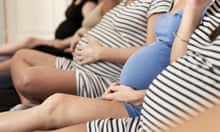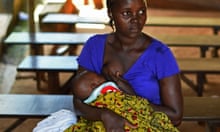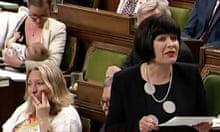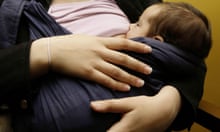The Dutch airline KLM is facing a storm of protest after warning that women who breastfeed their babies on its flights may be asked to cover up to avoid offending other passengers.
The company’s policy emerged after a woman claimed on Facebook she had been asked to shield herself from view while feeding her one-year-old on a flight between San Francisco and Amsterdam last month.
Shelby Angel, from Sacramento in California, said a flight attendant had approached her with a blanket, which she refused, saying she felt “uncomfortable and disrespected”.
Angel said she always sought to be discreet but that her daughter did not like to be covered. After complaining to KLM she was told it was the airline’s official policy and that passengers needed to be “respectful of people of other cultures”.
A KLM Twitter account later tweeted in response to the criticism prompted by the woman’s Facebook post, confirming that “to ensure that all our passengers of all backgrounds feel comfortable on board, we may request a mother to cover herself while breastfeeding, should other passengers be offended by this”.
Breastfeeding is permitted at KLM flights. However, to ensure that all our passengers of all backgrounds feel comfortable on board, we may request a mother to cover herself while breastfeeding, should other passengers be offended by this.
— Royal Dutch Airlines (@KLM) July 16, 2019
It added: “As an international airline company, we transport passengers with a variety of backgrounds. Not all passengers feel comfortable with breastfeeding in their vicinity and sometimes these passengers complain to the cabin staff.”
The response has led to other airlines being asked on social media to explain their stance. British Airways said it did not have an official policy but that passengers who required privacy should “please speak with one of the crew when you are board”.
KLM, which recently sought to burnish its credentials as an environmentally conscious airline by encouraging passengers to take fewer flights, has been accused of stigmatising mothers.
Niki Kandirikirira, from the Equality Now lobby group, said: “Negative attitudes about breastfeeding in public stem from the over-sexualisation of women’s bodies. Breastfeeding is a totally natural process and women should have the freedom to do it wherever and whenever they want, rather than being forced to hide as if they are doing something inappropriate.”
Physicians and health campaigners have expressed their frustration on social media at the “antiquated” policy of the airline.
One doctor tweeted: “I find it uncomfortable and offensive when people chew with their mouths open, infinitely more so than breastfeeding. Can you cover up the heads of passengers who do so with a blanket? Thanks!”
The World Health Organization (WHO) recommends that babies be breastfed exclusively for their first six months, then have a diet of breast milk and other food until they are two years old or beyond.
The NHS advises new mothers that breastfeeding reduces a baby’s risk of infection, diarrhoea and vomiting, sudden infant death syndrome, childhood leukaemia, obesity and cardiovascular disease in adulthood.
Ayala Ochert, from the campaign group Better Breastfeeding, said: “In their effort to avoid offence in the tiny minority of people disturbed by the sight of a child feeding, KLM has instead chosen to offend a mother trying to feed and nurture her child.”
The chief executive of the Breastfeeding Network, Shereen Fisher, added: “Companies and employers should be taking a lead on supporting and protecting breastfeeding.
“The recent poor treatment of a KLM customer who happened to also be a breastfeeding mother is another disappointing example of how treating people badly is not only bad for business but perpetuates a myth that breastfeeding in a public space is likely to invite controversy.
“Many mothers tell us they already feel isolated and embarrassed when breastfeeding, despite the irony of most of us being surrounded by images of nudity from a young age.
“Employers and providers of services can play an important role in putting women and their families at ease by supporting breastfeeding, which is a normal feeding practice across all societies and cultures. The law offers women protection to feed whenever and wherever they like and companies like KLM should take note of this.”
The airline said in a statement: “We would like to emphasise that breastfeeding is permitted on KLM flights. However, we strive to ensure that all of our passengers of all backgrounds feel comfortable onboard.”








